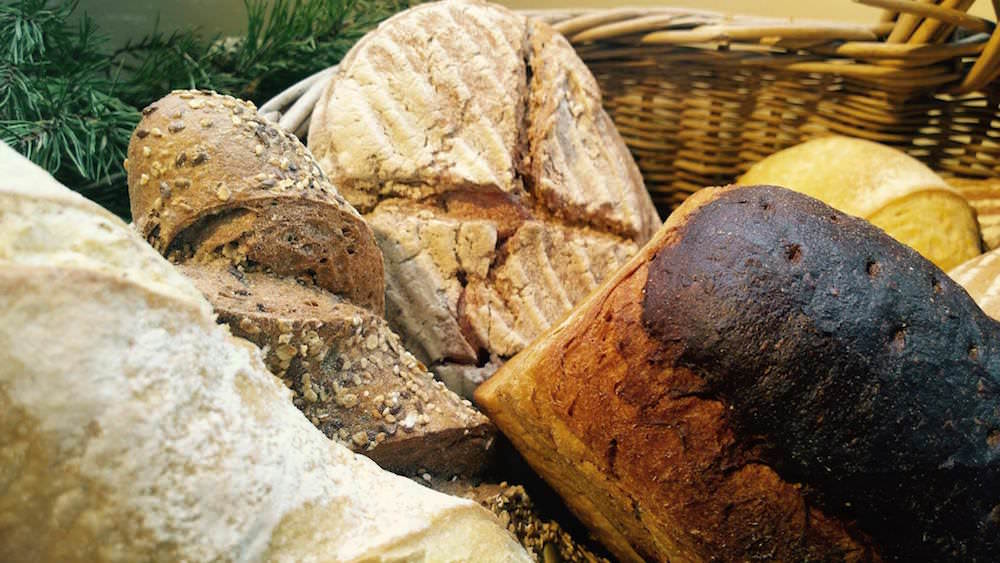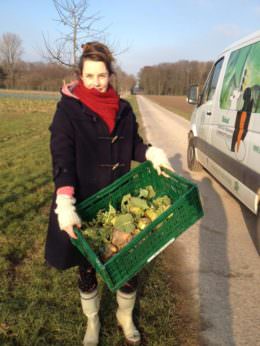A New Supermarket Lets You Pay What You Want for Less Than Perfect Food
At this grocery store in Cologne, Germany, you pay what you want for food, and even beer, that would normally be tossed out.
A New Supermarket Lets You Pay What You Want for Less Than Perfect Food
At this grocery store in Cologne, Germany, you pay what you want for food, and even beer, that would normally be tossed out.

10 percent of human-made greenhouse gas emissions come from producing, transporting, storing, and preparing food that is never eaten.
That’s right. You get to name your price for the fruits, vegetables, baked goods, and even beer (beer!) that don’t make the cut at regular stores because the items are either imperfect or have an expired sell by date, but are still perfectly edible.
Nicole Klaski, the woman behind the grocery store, called “The Good Food,” located in Cologne, launched it as part of her on-going fight against food waste, an international issue of immense proportions that is not only a waste of resources that could go to feed the hungry, but also has negative impacts on the environment. According to the non-profit EndFoodWaste.org, 10 percent of human-made greenhouse gas emissions come from producing, transporting, storing, and preparing food that is never eaten. In the U.S. alone, nearly half the food produced isn’t eaten.

“Any grocery store that takes would-be wasted food that’s still good and sells it at a big discount could definitely help in the fight against food waste,” says Jordan Figueiredo the founder of EndFoodWaste.org.
The Good Food gets its products from a variety of sources. Farmers let Klaski go into their fields after harvest to collect the vegetables that are too big, small, or so oddly shaped that they’ve been left behind. Shoppers can also buy items from large companies whose products’ sell-by dates have passed. Sell by dates don’t necessarily reflect an item’s freshness, according to a 2013 Harvard University study.
Nearly half the food produced in the U.S. isn’t even eaten.
“No one wants to throw the food away,” Klaski told the German website DW earlier this month. “We save the vegetables and expired products, and the producers are happy that their food is still eaten.”
The movement to sell food that would otherwise be thrown out, especially in regard to ugly fruits and vegetables, has been picking up steam in the last few years. There are other grocery stores that sell expired or less-than-perfect produce, including one in the U.S. The Boston non-profit Daily Table, started by former Trader Joe’s president Doug Rauch, opened in June 2015 and sells both expired and surplus foods at steep discounts. Even large grocery chains, such as Whole Foods Market and Walmart, sell ugly produce at reduced prices, thanks in part to campaigns from EndFoodWaste.org. But The Good Food remains unique thanks to its pay-what-you-think philosophy. A UK-based cafe chain with locations across Europe and Australia, The Real Junk Food Project, has a similar pricing model, too – their meals are made from what would otherwise be considered food waste from a variety of sources, and costumers pay what they feel is reasonable and can afford.
Figueiredo isn’t sure The Good Food model would work in the U.S. due to high rents and competition with food banks, which, he says do a “great job at donating already.” He does feel though that more grocery stores like Boston’s Daily Table could find their place.
“I definitely think Daily Table is awesome and can work in the U.S. and Grocery Outlet, while different and less healthy or fresh than Daily Table, has been working for decades,” he tells Modern Farmer in an email.
Follow us
This work is licensed under a Creative Commons Attribution-NoDerivatives 4.0 International License.
Want to republish a Modern Farmer story?
We are happy for Modern Farmer stories to be shared, and encourage you to republish our articles for your audience. When doing so, we ask that you follow these guidelines:
Please credit us and our writers
For the author byline, please use “Author Name, Modern Farmer.” At the top of our stories, if on the web, please include this text and link: “This story was originally published by Modern Farmer.”
Please make sure to include a link back to either our home page or the article URL.
At the bottom of the story, please include the following text:
“Modern Farmer is a nonprofit initiative dedicated to raising awareness and catalyzing action at the intersection of food, agriculture, and society. Read more at <link>Modern Farmer</link>.”
Use our widget
We’d like to be able to track our stories, so we ask that if you republish our content, you do so using our widget (located on the left hand side of the article). The HTML code has a built-in tracker that tells us the data and domain where the story was published, as well as view counts.
Check the image requirements
It’s your responsibility to confirm you're licensed to republish images in our articles. Some images, such as those from commercial providers, don't allow their images to be republished without permission or payment. Copyright terms are generally listed in the image caption and attribution. You are welcome to omit our images or substitute with your own. Charts and interactive graphics follow the same rules.
Don’t change too much. Or, ask us first.
Articles must be republished in their entirety. It’s okay to change references to time (“today” to “yesterday”) or location (“Iowa City, IA” to “here”). But please keep everything else the same.
If you feel strongly that a more material edit needs to be made, get in touch with us at [email protected]. We’re happy to discuss it with the original author, but we must have prior approval for changes before publication.
Special cases
Extracts. You may run the first few lines or paragraphs of the article and then say: “Read the full article at Modern Farmer” with a link back to the original article.
Quotes. You may quote authors provided you include a link back to the article URL.
Translations. These require writer approval. To inquire about translation of a Modern Farmer article, contact us at [email protected]
Signed consent / copyright release forms. These are not required, provided you are following these guidelines.
Print. Articles can be republished in print under these same rules, with the exception that you do not need to include the links.
Tag us
When sharing the story on social media, please tag us using the following: - Twitter (@ModFarm) - Facebook (@ModernFarmerMedia) - Instagram (@modfarm)
Use our content respectfully
Modern Farmer is a nonprofit and as such we share our content for free and in good faith in order to reach new audiences. Respectfully,
No selling ads against our stories. It’s okay to put our stories on pages with ads.
Don’t republish our material wholesale, or automatically; you need to select stories to be republished individually.
You have no rights to sell, license, syndicate, or otherwise represent yourself as the authorized owner of our material to any third parties. This means that you cannot actively publish or submit our work for syndication to third party platforms or apps like Apple News or Google News. We understand that publishers cannot fully control when certain third parties automatically summarize or crawl content from publishers’ own sites.
Keep in touch
We want to hear from you if you love Modern Farmer content, have a collaboration idea, or anything else to share. As a nonprofit outlet, we work in service of our community and are always open to comments, feedback, and ideas. Contact us at [email protected].by Andrew Amelinckx, Modern Farmer
February 17, 2017
Modern Farmer Weekly
Solutions Hub
Innovations, ideas and inspiration. Actionable solutions for a resilient food system.
ExploreExplore other topics
Share With Us
We want to hear from Modern Farmer readers who have thoughtful commentary, actionable solutions, or helpful ideas to share.
SubmitNecessary cookies are absolutely essential for the website to function properly. This category only includes cookies that ensures basic functionalities and security features of the website. These cookies do not store any personal information.
Any cookies that may not be particularly necessary for the website to function and are used specifically to collect user personal data via analytics, ads, other embedded contents are termed as non-necessary cookies.